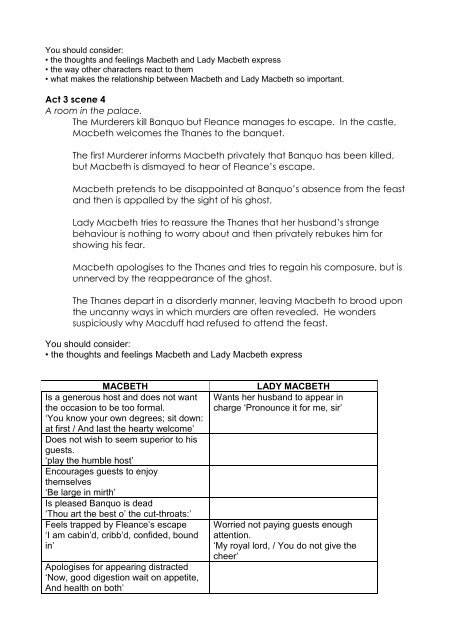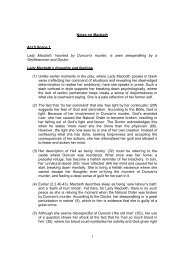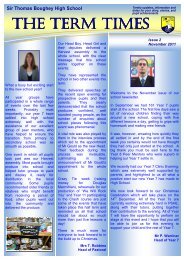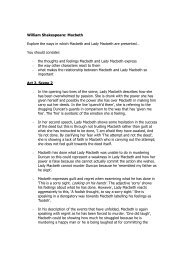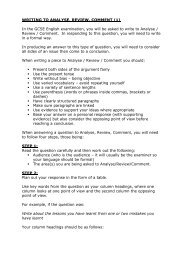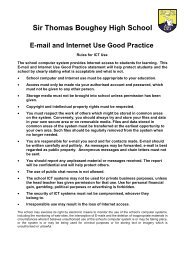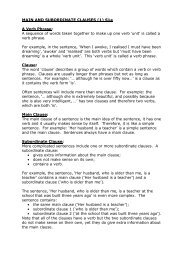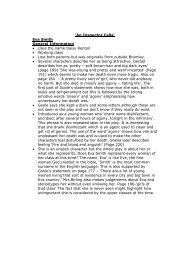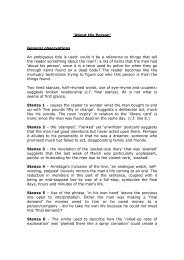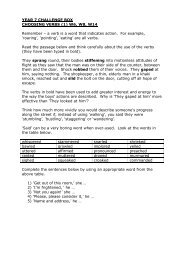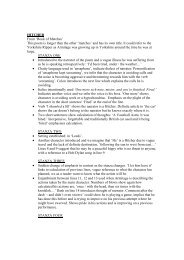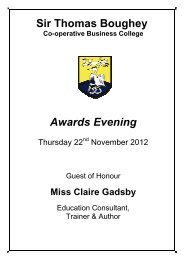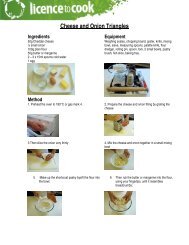Macbeth Act 3 Scene 4 Notes - Sir Thomas Boughey High School
Macbeth Act 3 Scene 4 Notes - Sir Thomas Boughey High School
Macbeth Act 3 Scene 4 Notes - Sir Thomas Boughey High School
Create successful ePaper yourself
Turn your PDF publications into a flip-book with our unique Google optimized e-Paper software.
You should consider:<br />
• the thoughts and feelings <strong>Macbeth</strong> and Lady <strong>Macbeth</strong> express<br />
• the way other characters react to them<br />
• what makes the relationship between <strong>Macbeth</strong> and Lady <strong>Macbeth</strong> so important.<br />
<strong>Act</strong> 3 scene 4<br />
A room in the palace.<br />
The Murderers kill Banquo but Fleance manages to escape. In the castle,<br />
<strong>Macbeth</strong> welcomes the Thanes to the banquet.<br />
The first Murderer informs <strong>Macbeth</strong> privately that Banquo has been killed,<br />
but <strong>Macbeth</strong> is dismayed to hear of Fleance’s escape.<br />
<strong>Macbeth</strong> pretends to be disappointed at Banquo’s absence from the feast<br />
and then is appalled by the sight of his ghost.<br />
Lady <strong>Macbeth</strong> tries to reassure the Thanes that her husband’s strange<br />
behaviour is nothing to worry about and then privately rebukes him for<br />
showing his fear.<br />
<strong>Macbeth</strong> apologises to the Thanes and tries to regain his composure, but is<br />
unnerved by the reappearance of the ghost.<br />
The Thanes depart in a disorderly manner, leaving <strong>Macbeth</strong> to brood upon<br />
the uncanny ways in which murders are often revealed. He wonders<br />
suspiciously why Macduff had refused to attend the feast.<br />
You should consider:<br />
• the thoughts and feelings <strong>Macbeth</strong> and Lady <strong>Macbeth</strong> express<br />
MACBETH<br />
Is a generous host and does not want<br />
the occasion to be too formal.<br />
‘You know your own degrees; sit down:<br />
at first / And last the hearty welcome’<br />
Does not wish to seem superior to his<br />
guests.<br />
‘play the humble host’<br />
Encourages guests to enjoy<br />
themselves<br />
‘Be large in mirth’<br />
Is pleased Banquo is dead<br />
‘Thou art the best o’ the cut-throats:’<br />
Feels trapped by Fleance’s escape<br />
‘I am cabin’d, cribb’d, confided, bound<br />
in’<br />
Apologises for appearing distracted<br />
‘Now, good digestion wait on appetite,<br />
And health on both’<br />
LADY MACBETH<br />
Wants her husband to appear in<br />
charge ‘Pronounce it for me, sir’<br />
Worried not paying guests enough<br />
attention.<br />
‘My royal lord, / You do not give the<br />
cheer’
Thinks Banquo is sat at the table<br />
‘The table’s full’<br />
Is suspicious of his guests<br />
‘Which of you have done this?’<br />
Appears to be going mad to the lords<br />
as shown by the exclamation marks<br />
and questions<br />
‘Prithee, see there! behold! look! lo!<br />
how say you?’<br />
Feels guilt for his actions<br />
‘murders have been perform’d / Too<br />
terrible for the ear’<br />
Tries to reassure guests that he is<br />
merely ill<br />
‘my most worthy friends, / I have a<br />
strange infirmity’<br />
Is desperate for the ghost to leave<br />
‘Avaunt! and quit my sight! let the earth<br />
hide thee!<br />
Pleads with the ghost to leave him<br />
alone.<br />
‘Hence, horrible shadow! Unreal<br />
mockery, hence!’<br />
Relieved when ghost vanishes<br />
‘I am a man again’<br />
Cannot believe his wife can act<br />
normally when he has been so scared.<br />
‘and keep the natural ruby of your<br />
cheeks, / When mine is blanched with<br />
fear’<br />
Appears to regret his actions.<br />
‘They say, blood will have blood’<br />
Is going to return to the witches to hear<br />
what they have to say.<br />
‘And betimes I will to the weird sisters:<br />
More shall they speak’<br />
Lady <strong>Macbeth</strong> tries to excuse her<br />
husband’s behaviour<br />
‘my lord is often thus, / And hath been<br />
from his youth…he will be well again’<br />
Again, tells off her husband for his<br />
behaviour<br />
‘Fie, for shame!’<br />
Tries to convince the lords that<br />
<strong>Macbeth</strong> frequently behaves this way<br />
‘Think of this, good peers, / But as a<br />
thing of custom’<br />
Appears concerned over her husband’s<br />
behaviour.<br />
‘I pray you, speak not; he grows worse<br />
and worse’<br />
Tells her husband he is merely tired<br />
‘You lack the season of all natures,<br />
sleep’
• the way other characters react to them<br />
MACBETH<br />
Formal response by guests<br />
‘Thanks to your majesty’<br />
Lennox keen to please the king<br />
‘May’t please your highness sit’<br />
Ross doesn’t want <strong>Macbeth</strong> to worry<br />
about Banquo (not knowing of<br />
Banquo’s murder) and wants the king<br />
to enjoy the company present.<br />
‘Please’t your highness / To grace us<br />
with your royal company’<br />
Lords worried they have offended the<br />
king and are uncertain of what <strong>Macbeth</strong><br />
is talking about.<br />
‘What, my good lord?’<br />
Concerned <strong>Macbeth</strong> has become ill<br />
‘his highness is not well’<br />
Lords want to reassure <strong>Macbeth</strong> they<br />
understand<br />
‘Our duties, and the pledge’<br />
Ross wants to know more of what<br />
<strong>Macbeth</strong> is talking about.<br />
‘What sights, my lord?’<br />
Polite even at end of evening<br />
‘and better health / Attend his majesty!’<br />
LADY MACBETH<br />
• what makes the relationship between <strong>Macbeth</strong> and Lady <strong>Macbeth</strong> so important.<br />
MACBETH<br />
Suggests to Lords the closeness to his<br />
wife by asking her to formally begin the<br />
evening.<br />
‘We will require her welcome’<br />
Reassures wife that all will be well<br />
‘See, they encounter thee with their<br />
hearts’ thanks.<br />
Treats his wife as an equal and speaks<br />
openly to her<br />
‘Ay, and a bold one,’<br />
LADY MACBETH<br />
Plays the generous hostess to her<br />
husband – appears to guests as<br />
though she does as she is told<br />
‘Pronounce it for me, sir, to all our<br />
friends’<br />
Loves husband and doesn’t want lords<br />
to be suspicious of <strong>Macbeth</strong>’s<br />
behaviour<br />
Tells off her husband and wants to<br />
know what is wrong with him<br />
‘Are you a man?’<br />
Again chastises her husband for being<br />
silly and tries to bring him back to<br />
reality<br />
‘This is the very painting of your fear:’<br />
‘Shame itself!’
Shows togetherness with wife – use of<br />
‘We’<br />
‘Come, we’ll to sleep’<br />
‘We are yet but young in deed.’<br />
‘You look but on a stool.’<br />
Tries to reassure her husband<br />
‘My worthy lord’<br />
Shows her strength in the relationship<br />
by telling off her husband.<br />
‘You have displaced the mirth, broke<br />
the good meeting, with most admired<br />
disorder’<br />
<strong>Act</strong> 3 sc 4<br />
Enter <strong>Macbeth</strong>, Lady <strong>Macbeth</strong>, Ross, Lennox, Lords, and Attendants:<br />
The first stage direction, "A banquet prepared " (3.4.1, s.d.), is important. To prepare a<br />
banquet, servants would bring in tables, stools, dishes, cutlery, cups, food, and drink.<br />
This hustle and bustle makes it seem like a good time is going to be had by all. <strong>Macbeth</strong><br />
certainly seems in the mood. He welcomes everyone at once, saying, "You know your<br />
own degrees; sit down. At first / And last the hearty welcome" (3.4.1-2). The "degrees"<br />
of the guests are their social ranks. Normally, each guest would receive an individual<br />
greeting and then be escorted to his seat, with the highest ranking person sitting closest<br />
to the king, and the next highest the next closest, etc. <strong>Macbeth</strong> tells them that they know<br />
where they should sit, and welcomes everyone at once. He will "play the humble host"<br />
(3.4.4), showing how friendly and down-to-earth he is, even though he is now the king.<br />
First Murderer appears at the door:<br />
Just as <strong>Macbeth</strong> is taking his place among all of his loving subjects, he sees First<br />
Murderer come to the door with blood on his face. Not wanting anyone else to see the<br />
bloody man, <strong>Macbeth</strong> jumps up and hurries to the door. As he goes, he tells his guests<br />
that in a minute "we'll drink a measure / The table round" (3.4.11-12).<br />
<strong>Macbeth</strong> whispers with the murderer at the door. (Of course we can hear what they say,<br />
but <strong>Macbeth</strong>'s guests can't.) First Murderer says that the blood on his face is Banquo's.<br />
In reply, <strong>Macbeth</strong> makes a cruel joke, saying that it's better for the blood to be on the<br />
outside of the murderer than on the inside of Banquo: "'Tis better thee without than he<br />
within" (3.4.14). Despite his disappointment that Fleance escaped with his life, there's<br />
nothing more to be done in this matter, so <strong>Macbeth</strong> tells First Murderer to leave. Just at<br />
this moment Lady <strong>Macbeth</strong> comes with some advice for her husband. She is afraid that<br />
<strong>Macbeth</strong>'s behaviour — standing at the door and apparently saying nothing — will<br />
make the guests feel unwelcome. She tells him, "The feast is sold / That is not often<br />
vouch'd, while 'tis a-making, / 'Tis given with welcome" (3.4.32-34). She means that a<br />
host makes his guests feel welcome by often inviting them to eat and drink freely. If a<br />
feast is not thus "vouch'd," it's no better than a meal that is "sold" at an inn. She goes on<br />
to say that if a person just wants to eat, the best place to do that is at home. Away from
home, the most important thing for a guest is to be treated like a guest. This again is<br />
Lady <strong>Macbeth</strong> appearing to take charge of her husband’s behaviour.<br />
Enter the Ghost of Banquo and sits in <strong>Macbeth</strong>'s place.<br />
Taking his wife's advice to heart, which again emphasises the trust he has in her,<br />
<strong>Macbeth</strong> returns to his guests, wishing them good digestion, good appetite, and good<br />
health. As he is doing so, the last stool is take by an uninvited guest — the Ghost of<br />
Banquo.<br />
<strong>Macbeth</strong> is so busy playing the good host that he doesn't notice the ghost. No one else<br />
sees the ghost, either, because it's invisible to everyone except <strong>Macbeth</strong>. Ironically,<br />
<strong>Macbeth</strong> now chooses to comment about Banquo's absence from the banquet. He says,<br />
"Here had we now our country's honour roof'd, / Were the graced person of our Banquo<br />
present / Who may I rather challenge for unkindness / Than pity for mischance!"<br />
(3.4.39-42). If you "roof" an honour, you put the top on it. <strong>Macbeth</strong> is literally praising<br />
Banquo to the skies, but he also takes care to mention that he's sure that Banquo is<br />
absent because of Banquo's own "unkindness," not because of any "mischance" that<br />
could have happened to him. Ross agrees that Banquo should have kept his promise to<br />
come to the banquet, then invites <strong>Macbeth</strong> to sit among them. This is exactly the sort of<br />
thing that <strong>Macbeth</strong> wants; he hopes to be seen by the thanes as not only their king, but<br />
their friend. He starts towards the table, then sees that there's no empty stool. He can't<br />
find a place for himself and says, "The table's full" (3.4.45).<br />
It takes <strong>Macbeth</strong> a moment before he sees why the table is full. When Lennox points to<br />
the empty place, <strong>Macbeth</strong> asks where it is, looks harder, and sees the bloody figure of<br />
Banquo's Ghost. At first <strong>Macbeth</strong> thinks it might be some sort of ghastly joke, and asks,<br />
"Which of you have done this?" (3.4.48), but no one knows what he's talking about.<br />
Then <strong>Macbeth</strong> speaks to the ghost, saying "Thou canst not say I did it: never shake /<br />
Thy gory locks at me" (3.4.50). The ghost's "locks" of hair are "gory" because — as<br />
First Murderer told <strong>Macbeth</strong> — Banquo died with twenty gashes on his head.<br />
At this point Ross thinks it best if they all just go away and leave <strong>Macbeth</strong> alone, but<br />
Lady <strong>Macbeth</strong> covers for her husband – again, emphasising the strength she appears to<br />
bring to the relationship. She asks everyone to stay seated, and explains that <strong>Macbeth</strong> is<br />
often like this, and has been ever since he was young. He'll recover in a moment, she<br />
says, but if they stare at him, it will only make him worse, so they should just eat and<br />
pretend that nothing has happened.<br />
The guests do as they are told, and Lady <strong>Macbeth</strong> takes her husband aside. As she did<br />
early in the play, Lady <strong>Macbeth</strong> challenges her husband's manhood. The first thing out<br />
of her mouth is the insulting question, "Are you a man?" (3.4.57). <strong>Macbeth</strong> answers that<br />
he's not only man, he's a bold man who can look at things that might frighten the devil.<br />
His wife is not impressed. She exclaims sarcastically, "O proper stuff!" Then she tells<br />
him that "This is the very painting of your fear: / This is the air-drawn dagger which,<br />
you said, / Led you to Duncan" (3.4.59-62). She also tells him that he's making<br />
ridiculous faces, so that he reminds her of a woman telling a scary story that she heard
from her grandmother. His fear is shameful because, "When all's done, / You look but<br />
on a stool" (3.4.66-67).<br />
Of course, where Lady <strong>Macbeth</strong> sees a stool, <strong>Macbeth</strong> sees the Ghost of Banquo. He<br />
tells her to "see" for herself, to "behold," to "look." As <strong>Macbeth</strong> speaks, the ghost nods<br />
at him, and he challenges the ghost to speak up: "Why, what care I? If thou canst nod,<br />
speak too" (3.4.69). Of course, the ghost does not speak, but <strong>Macbeth</strong> does, saying "If<br />
charnel-houses and our graves must send / Those that we bury back, our monuments /<br />
Shall be the maws of kites" (3.4.70-72). "Monuments," like "charnel-houses" and<br />
"graves," are the places where the dead belong. "Kites" are hawks, and their "maws" are<br />
their entire eating apparatuses — beaks, gullets, and stomachs. An ancient fear was that<br />
a person who was not properly buried would have his bones picked clean by birds.<br />
<strong>Macbeth</strong> thinks that the dead ought to stay where they belong; if the graves are going to<br />
send the bodies back, the kites, with their maws full of human flesh, are going to be the<br />
only real graves. In short, <strong>Macbeth</strong> is describing the horror that he himself has created.<br />
He wanted Banquo killed away from the castle, in the dark, out of sight. That was done,<br />
but the body was left in a ditch, and now it has come back to show <strong>Macbeth</strong> the truth of<br />
what he has done.<br />
As <strong>Macbeth</strong> is saying this, the Ghost of Banquo exits. (We don't know if the Ghost is<br />
supposed to suddenly vanish, or just walk out. Shakespeare doesn't provide a stage<br />
direction.) Lady <strong>Macbeth</strong> continues her insult her husband, but <strong>Macbeth</strong> is sure he saw<br />
what he saw. He even tries to explain that it's not his fault that the Ghost showed up. He<br />
says that men have been killing men for a long time, since before there were even laws<br />
against it: "Blood hath been shed ere now, i' the olden time, / Ere human statute purged<br />
the gentle weal" (3.4.74-75). It's a natural thing to shed blood; what's not natural is that<br />
now the dead "rise again, / With twenty mortal murders on their crowns, / And push us<br />
from our stools" (3.4.81).<br />
Having said this, <strong>Macbeth</strong> seems to calm down. At the same time, his wife changes her<br />
tune. Instead of telling him again that he's not a real man, she points out that his guests<br />
need him to come back to the banquet. This suggests to the audience that she knows<br />
how far to push her husband but also recognises there are times to leave him alone.<br />
Hearing this, he returns to his guests, telling them that they shouldn't wonder at what<br />
they've just seen. (They've haven't seen the Ghost, only <strong>Macbeth</strong> making faces and<br />
talking to the stool.) Not to worry, <strong>Macbeth</strong> says. He happens to have a "strange<br />
infirmity, which is nothing / To those that know me" (3.4.85-86). Now he returns to his<br />
role as genial host. He calls for wine and proposes a toast to "the general joy o' the<br />
whole table, / And to our dear friend Banquo, whom we miss" (3.4.88-89). But as<br />
<strong>Macbeth</strong> reaches this height of hypocrisy, the Ghost returns.<br />
This time <strong>Macbeth</strong> shows he's a real man. This time his wife won't be able to accuse<br />
him of being a fearful girl. As soon as the Ghost appears, <strong>Macbeth</strong> tries to drive it away<br />
with words: "Avaunt! and quit my sight! let the earth hide thee! / Thy bones are<br />
marrowless, thy blood is cold; / Thou hast no speculation in those eyes" (3.4.92-95)<br />
"Avaunt! and quit my sight! let the earth hide thee! / Thy bones are marrowless, thy
lood is cold; / Thou hast no speculation in those eyes" (3.4.92-95). "Speculation" is the<br />
ability to see. <strong>Macbeth</strong> is making sure that the Ghost knows that it belongs in the grave<br />
because it is very, very dead. Lady <strong>Macbeth</strong> tries to tell the guests that her husband<br />
does this all the time. It doesn't mean anything; it just spoils the banquet.<br />
But <strong>Macbeth</strong> doesn't care about the guests or the banquet. He is determined to face<br />
down the Ghost. He tells it that he dares to do anything a man can do. He would not<br />
tremble if the Ghost should take the shape of a terrible beast. "Or be alive again, / And<br />
dare me to the desert with thy sword; / If trembling I inhabit then, protest me / The baby<br />
of a girl" (3.4.102-105). A "desert" doesn't have to have sand in it; it's just any deserted<br />
place where they could be alone and fight man to man. "Protest" means "proclaim," and<br />
"if trembling I inhabit" means "if I live inside a trembling body." <strong>Macbeth</strong> is daring the<br />
Ghost to come alive and fight. If it does, and <strong>Macbeth</strong> shows fear, then it can tell the<br />
world that <strong>Macbeth</strong> is a coward.<br />
Finally, <strong>Macbeth</strong>'s defiance works. Again he tells the Ghost to go away, and it goes.<br />
Using the word "so" as we do when we say "so much for that," <strong>Macbeth</strong> expresses his<br />
satisfaction and asks his guests to stay seated: "Why, so: being gone, / I am a man<br />
again. Pray you, sit still" (3.4.106-107). But it's too late. His wife tells him that he has<br />
"displaced the mirth, broke the good meeting, / With most admired disorder" (3.4.108-<br />
109). "Admired" does not mean "admirable," but "amazing" or "obvious." She means<br />
that after all they have seen, his guests are not going to be in any mood to go on with<br />
the banquet.<br />
<strong>Macbeth</strong> tries to justify himself. He asks his wife (and perhaps his guests) "Can such<br />
things be, / And overcome us like a summer's cloud, / Without our special wonder?"<br />
(3.4.109-111). "Overcome" means "come over," and a "summer's cloud" is something<br />
that can come over us very quickly. As for the word "us," <strong>Macbeth</strong> is entitled to use it<br />
because he is king, but it seems that he also means that anyone — all of us — would<br />
react as he did. He goes on to say that he's starting to question himself because "you can<br />
behold such sights, / And keep the natural ruby of your cheeks, / When mine is<br />
blanched with fear" (3.4.113-115).<br />
<strong>Macbeth</strong> thinks that the others have seen the Ghost, too. They have not, but when Ross<br />
asks <strong>Macbeth</strong> what he's seen, that's one question too many for Lady <strong>Macbeth</strong>. She<br />
doesn't know what her husband thought he was seeing, but whatever it was, she doesn't<br />
want him talking about it. She quickly gets rid of the guests, telling them that if they<br />
question <strong>Macbeth</strong>, it will only make him worse.<br />
Exeunt all but <strong>Macbeth</strong> and Lady <strong>Macbeth</strong>:<br />
As Lady <strong>Macbeth</strong> says a hasty goodbye to the guests, <strong>Macbeth</strong> seems not to notice or<br />
care about anything except his own thoughts. He mutters to himself that "they say,<br />
blood will have blood" (3.4.121). The saying means that the blood of a murder victim<br />
will seek out the blood of his killer, and so a murder will always be discovered.<br />
<strong>Macbeth</strong> knows that stones have moved, trees have spoken, birds have told secrets. All<br />
of these things have "brought forth / The secret'st man of blood" (3.4.124-125).
<strong>Macbeth</strong> himself is a secret man of blood, and the bloody Ghost confronted him. His<br />
guilt was almost "brought forth" in front of his guests. None of this makes him feel<br />
remorse, or anything but a determination to see things through to the bitter end. He<br />
immediately starts thinking of what must be done next, and asks his wife what she<br />
thinks of the fact that Macduff has refused to come to their banquet. She asks if he has<br />
sent for Macduff, to get an explanation. He answers that he will send for him, and<br />
besides, "There's not a one of them but in his house / I keep a servant fee'd" (3.4130-<br />
131). A "servant fee'd" is a spy, and "them" almost certainly refers to his banquet guests<br />
and all the other noblemen who are supposed to be his loyal subjects. He trusts no one.<br />
In addition to dealing with Macduff, <strong>Macbeth</strong> will speak again with the witches:<br />
More shall they speak; for now I am bent to know,<br />
By the worst means, the worst. For mine own good,<br />
All causes shall give way: I am in blood<br />
Stepp'd in so far that, should I wade no more,<br />
Returning were as tedious as go o'er:<br />
Strange things I have in head, that will to hand;<br />
Which must be acted ere they may be scann'd. (3.4.133-139)<br />
He knows that the witches are "the worst means," and he expects they will tell him "the<br />
worst" that can happen to him, but he's going to speak to them anyway, because his<br />
"own good" is the only thing he cares about. He is in the middle of a river of blood, and<br />
he might as well go over to the other side. That means that he will have to do "strange"<br />
(and bloody) things right away, before he has "scanned" them. This is implies that if he<br />
did scan them, look at them, think about them, he might not do them. All in all, he<br />
doesn't seem to have much hope of happiness from doing the evil he feels he must do.<br />
Now, at the very end of the scene, Lady <strong>Macbeth</strong> seems to be in a gentler mood. She<br />
tells her husband that he needs to sleep. He replies, "Come, we'll to sleep. My strange<br />
and self-abuse / Is the initiate fear that wants hard use: / We are yet but young in deed"<br />
(3.4.141-143). Without changing his mind about what he's going to do, he's trying to<br />
put the best face on things. His "strange and self-abuse" is his reaction to the Ghost of<br />
Banquo, but now he sees that it was only the result of beginner's nerves, "intiate fear."<br />
That fear can be cured by "hard use," by doing more, by wading more deeply into the<br />
river of blood.<br />
[There's an unconscious irony in <strong>Macbeth</strong>'s final statement. He has killed King Duncan,<br />
his grooms, and Banquo, so he is hardly "young in deed," but he believes that more<br />
such deeds will solve his problems.


